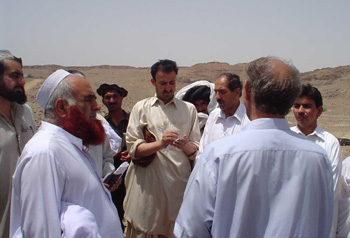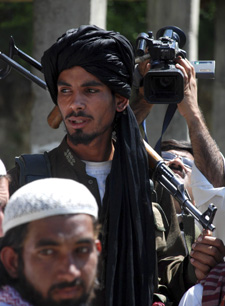The fighting along the border in Pakistan is a classic counter-insurgency: a large military force trying to oust an entrenched group from its base. Such armed conflict will always be risk-filled—especially for local journalists—but government leaders, military officials, and media executives can take basic steps to improve security.
Pakistani journalists have long asked that their employers supply safety training and protective gear for combat situations. Some news organizations did offer employees protective gear when fighting escalated this year, but the vast majority of reporters (particularly those not embedded with the military) were left to fend for themselves. Many journalists told me that even full-time staff members for prominent, profit-making news organizations were sent into the field without protective equipment. Pakistani news organizations should equip all staff deployed in hostile environments with training and equipment that meets internationally recognized standards.

The 2006 murder of Hayatullah Khan in the Federally Administered Tribal Areas still resonates among his colleagues, many of whom suspect that Pakistan’s powerful Directorate for Inter-Services Intelligence (ISI) was involved. The government of Asif Ali Zardari can clear up this question by releasing the August 2006 investigative report compiled by Peshawar High Court Judge Mohammed Reza Khan, along with the findings of other investigations commissioned at the time. If Judge Khan’s report was inconclusive, the government should investigate further. Pakistan has one of worst records in the world when it comes to deadly violence against journalists and its own inability to solve these crimes. Releasing the Khan investigative reports—and then following up—would demonstrate a commitment to changing this record of impunity.
The government should ease coverage restrictions on reporters embedded with the military. Suppressing footage or reporting, even if they temporarily put the military in a negative light, is counterproductive. A set of clearly written rules of reporting, agreed upon by both sides, can both protect military security and ensure the integrity of news coverage.

In Peshawar, non-embedded journalists told me they had little or no access to military commanders. Taliban militants, on the other hand, maintain a 24/7 web of spokesmen, with lower-level commanders often available for comment as well. The Pakistani military, while making some recent strides toward better media relations, is still not as accessible as it should be. In addition, the military should train its troops on rules of conduct when encountering non-embedded journalists in the field.
And this final thought about the freedom and safety of local journalists covering a war of global significance: As the U.S. government calculates its strategy in Afghanistan and Pakistan, it should reassess its own approach toward journalists in the field. The U.S. military should set an international example by training its troops on rules of conduct when they encounter local reporters in the field. To be effective, those rules should be written in consultation with the global community of journalists, and the next edition of the military’s Counterinsurgency Field Manual should include those rules. The COIN-FM reflects the most current thinking of the world’s most prominent military. It is the rule book by which U.S. troops behave in the field, and those rules must be laid down clearly. Once the U.S. has established those rules, it can use its influence on other militaries around the world to adapt those practices too.
The series:
Part 1: During an all-out military offensive, local reporters faced grave risks. Some literally lost their homes.
Part 2: Dozens of journalists flee the Swat Valley and nearby areas, leaving independent local coverage scant.
Part 3: Coverage of the fighting was left in large part to Pakistani reporters from outside the region who had embedded with the military.
Part 4: Hayatullah Khan was murdered in 2006 in the Federally Administered Tribal Areas. The government investigated—and then kept its reports secret.
Part 5: Government, media can undertake reforms to improve security.
